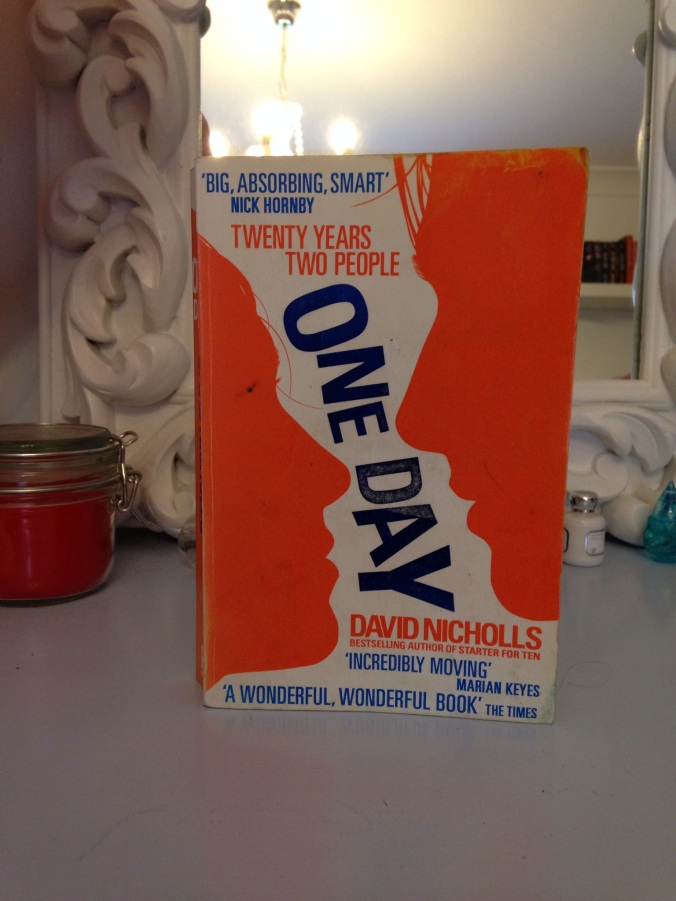Having just finished reading this masterpiece, I can shamelessly reveal that I’ve been having an intense love affair with it for the past few days. I feel like it was made for me; destiny brought us together. Unlike many relationships, the timing was perfect but now I feel heartbroken that it’s over – yet happy it happened. Corny as it sounds, what I’m trying to tell you all, is that One Day is one of those few books that will move you and change your life in unexpected ways, and bloody hell it’s going to take me a joyously long time to forget it. This review will act as a sincere plea for anyone who has managed to escape this book’s captivating charm to stop doing whatever you are doing, to buy it, and to read it – immediately.
Now, I have recently come to realise that I neither have the time nor the money to read all the books on my ever-expanding ‘to read’ list, so when I picked up One Day during my lazy volunteer shift at Oxfam bookshop, I was planning on only dipping into it to pass the long hours spent working. However, I found it so utterly irresistible and absorbing from the very first page, that I couldn’t bring myself to leave the shop without it.
For those of you who don’t know, it tells the bittersweet love story of Dexter Mayhew and Emma Morley, beginning on July 15th 1988 – the morning after their graduation. It follows them on their journey through life, catching up with them on the same day every year, for twenty years. This structure enables us to see the twists and turns that their relationship takes; we see them change and grow as people, and we witness the pains and pleasures that life relentlessly throws at them. Most importantly however, we fall in love with them ourselves. Ostentatious Dexter and self-effacing Emma are brutally realistic characters, who share the same hopes and fears as anyone from any age and background – even David Nicholls himself. As a pair, Em and Dex perfectly reflect that uncertainty, fear and hopefulness that comes packaged alongside graduation, and that impending descent into what is too often called ‘the real world’.
On first glances, it would appear that such deep and earnest characters must come from personal experience, and a little research told me I was correct. David Nicholls himself admitted that he was late to enter adulthood, calling his twenties “a sea of worry.” He, like many others, found post-university time difficult, describing it as a “restless, anxious time.” He didn’t feel ready to follow his parents’ domestic footsteps and this uncertainty can be seen through the lives of the characters he has created. In this modern day, so many young, free minds are pressured into decisions they are unsure about, and told that they need to know what they want to do in life. For me, One Day is written confirmation that sometimes it takes a little while for you to realise what really makes you tick, and also what is good for you and your future.
As for the ending, I cried – and I rarely cry at books. It was heartbreaking to see Dexter descending back to into alcoholism, and yet strangely I feel like I would have been disappointed with a classic fairytale ending. [Spoiler Alert] Emma’s death fitted the overall message that the book gave me – life doesn’t always go as planned, but you have to make the most of it while it’s there. Do a lot, don’t deny yourself what you love, and of course, seize the day and all that, as Emma would say.
For me then, One Day and its author act as a comforting reminder that mistakes are vital for growth. It has the enchanting power to spark a reminiscence of youth for some, yet acts as guidance and comfort for youngsters feeling rushed into adulthood. It is a book which perfectly reflects that uncertainty and fear of the future which is inherent in human beings whatever age you are, and as a student going into my final year of University (yikes), I feel like One Day was welcomed into my life at just the right moment.

